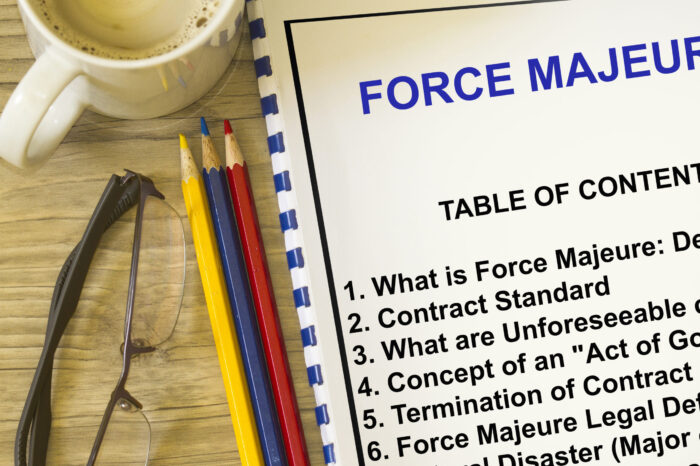
The Applicability of a Force Majeure Clause in Lease Agreements

Force majeure clauses allocate risk between the parties when an unanticipated event makes performance impossible or impracticable. The principle underlying the doctrine is simple and is set forth in California Civil Code § 3526, which states that “[n]o man is responsible for that which no man can control.” Generally, a force majeure clause is triggered when the occurrence of a force majeure event ultimately renders performance so impracticable that it is excused. A force majeure even is sometimes more commonly referred to as an “act of God”; however, it applies when there is an insurmountable interference with a party’s ability to meet its contractual obligations, whether man-made or not. Pac. Vegetable Oil Corp. v. C.S.T., Ltd. (1946) 29 Cal.2d 228, 238. The interference must be no fault of the non-performing party and the party seeking to invoke a force majeure clause must show “that, in spite of skill, diligence, and good faith on his part, performance became impossible or unreasonably expensive” due to the force majeure event. Ibid. As such, the person invoking the clause must demonstrate that the force majeure event was the proximate cause of nonperformance.
Agreements With a Force Majeure Clause
California case law has demonstrated that compliance with a contract that involves greater expense or hardship than anticipated does not by itself excuse the obligation. Instead, the party bearing the burden must prove that there exists “extreme and unreasonable difficulty, expense, injury, or loss involved.” See Metzler v. Thye (1912) 163 Cal. 95, 98; see also Oosten v. Hay Haulers Dairy Employees & Helpers Union (1955) 45 Cal.2d 784, 788. Similarly, California law requires that parties invoking force majeure demonstrate that “sufficient” or “reasonable” efforts were made to avoid the consequences of the force majeure event. See Butler v. Nepple (1960) 54 Cal.2d 589, 599. Commercial leases typically include force majeure provisions. If such a provision is present in an agreement, the explicit language should be examined. California courts have traditionally given force majeure clauses a strict interpretation so that the terms of the agreement will generally control and will be enforced by the courts. While specification of any force majeure event in many states will preclude other force majeure events from being included within the definition, California has interpreted such provisions less narrowly in that a non-listed event can still fit within a written force majeure provision if it is “unforeseeable at the time of contracting.” See Autry v. Republic Productions (1947) 30 Cal.2d 144.
It is further important to note that in order to invoke a force majeure clause in a lease, the lease may require prompt notice of a claim of force majeure. Failure to provide adequate notice for such a claim under the provisions of the lease may result in a forfeiture of the claim.
Agreements Without a Force Majeure Clause
In the absence of any applicable contract language or when a non-listed event in a force majeure provision occurs, contract law has recognized situations where a party’s contractual performance is made impossible or impractical by intervening and unforeseeable events. To protect against such situations, the California legislature codified equitable protections in Civil Code §1511(2), which provides that the performance of an obligation is excused “[w]hen it is prevented or delayed by an irresistible, superhuman cause, or by the act of public enemies of this state or of the United States, unless the parties have expressly agreed to the contrary.” (Emphasis added.) In essence, the aforementioned code section acts as a default force majeure clause for a contract that does not have one, which would allow a party to take advantage of force majeure protections. In California, the test for whether a force majeure situation is present is “whether under particular circumstances there was such an insuperable interference occurring without the party’s intervention as could not have been prevented by the exercise of prudence, diligence and care.” Pac. Vegetable Oil Corp. v. C.S.T., Ltd., supra, 29 Cal.2d at p. 238.
In order for a party to take advantage of the force majeure protections pursuant to Civil Code § 1511(2), the nonperforming party must be able to prove that (1) the force majeure is responsible for the inability to pay, and (2) it was unforeseeable. For example, a business that was suffering financially before the pandemic may not be able to effectively use the coronavirus as an excuse without proving a direct connection to its failure to pay rent. As a further matter, the burden resulting from the event must be more than an increase in expense or financial difficulty. That is, the breach must result from circumstances that are “extreme and unreasonable.” Butler v. Nepple, supra, 54 Cal.2d at p. 599. With respect to force majeure, Witkin’s Summary of Law has indicated that it is the equivalent of the common law contract defense of impossibility. 1 Witkin, Summary of Cal. Law (10th ed. 2005) Contracts, § 828, pp. 916-917. As to impossibility, California courts have held that the inability to perform “must consist in the nature of the thing to be done and not in the inability of the obligor to do it.” El Rio Oils, Canada, Limited v. Pacific Coast Asphalt Co. (1949) 95 Cal.App.2d 186, 197. As such, where a party’s inability to perform is due to the disruption and/or closure of supply chains and vendors, this may provide further support for the application of a force majeure clause in light of the impact that the disruption has had on the industry.
Contact Dias Law Firm, Inc. today to set up a consultation if you have an issue with your lease agreement. Our knowledgeable attorneys and staff are here to assist you with your legal matter.
By: Ella R. Floresca, Esq.

For the general public: This Blog/Web Site is made available by the law firm publisher, Dias Law Firm, Inc., for educational purposes. It provides general information and a general understanding of the law, but does not provide specific legal advice. By using this site, commenting on posts, or sending inquiries through the site or contact email, you confirm that there is no attorney-client relationship between you and the Blog/Web Site publisher. The Blog/Web Site should not be used as a substitute for competent legal advice from a licensed attorney in your jurisdiction.
For attorneys: This Blog/Web Site is informational in nature and is not a substitute for legal research or a consultation on specific matters pertaining to your clients. Due to the dynamic nature of legal doctrines, what might be accurate one day may be inaccurate the next. As such, the contents of this blog must not be relied upon as a basis for arguments to a court or for your advice to clients without, again, further research or a consultation with our professionals.

